- music for percussion
- Tanglewood
- Miloslav Kabeláč
- Greenland
- Aaron Rabushka
- San Diego Symphony
- Orion Weiss
- Concerto Amsterdam
 DISCUSSION: John Dante Prevedini leads a discussion about Composers, individuals or collective?, including contributions from David Arditti, Halida Dinova, Robert McCarney and Jane Stanley.
DISCUSSION: John Dante Prevedini leads a discussion about Composers, individuals or collective?, including contributions from David Arditti, Halida Dinova, Robert McCarney and Jane Stanley.
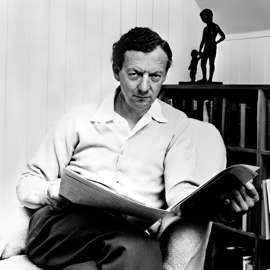 SPONSORED: Ensemble. Last Gasp of Boyhood. Roderic Dunnett investigates Jubilee Opera's A Time There Was for the Benjamin Britten centenary.
SPONSORED: Ensemble. Last Gasp of Boyhood. Roderic Dunnett investigates Jubilee Opera's A Time There Was for the Benjamin Britten centenary.
All sponsored features >>
Truly a Spectacle
FRANCES FORBES-CARBINES strongly recommends Puccini's 'Turandot' at Covent Garden
Our English word spectacle is from the Latin spectaculum, meaning 'public show'. When people attend an opera they attend not only for the music, but for the visual extravagance: we want to feel as though we are transported from the everyday into a land of fantasy. Turandot at the Royal Opera House truly is a spectacle: from the lavish sets, to the amazing costumes, to the synchronised dances, everything certainly has the wow factor.
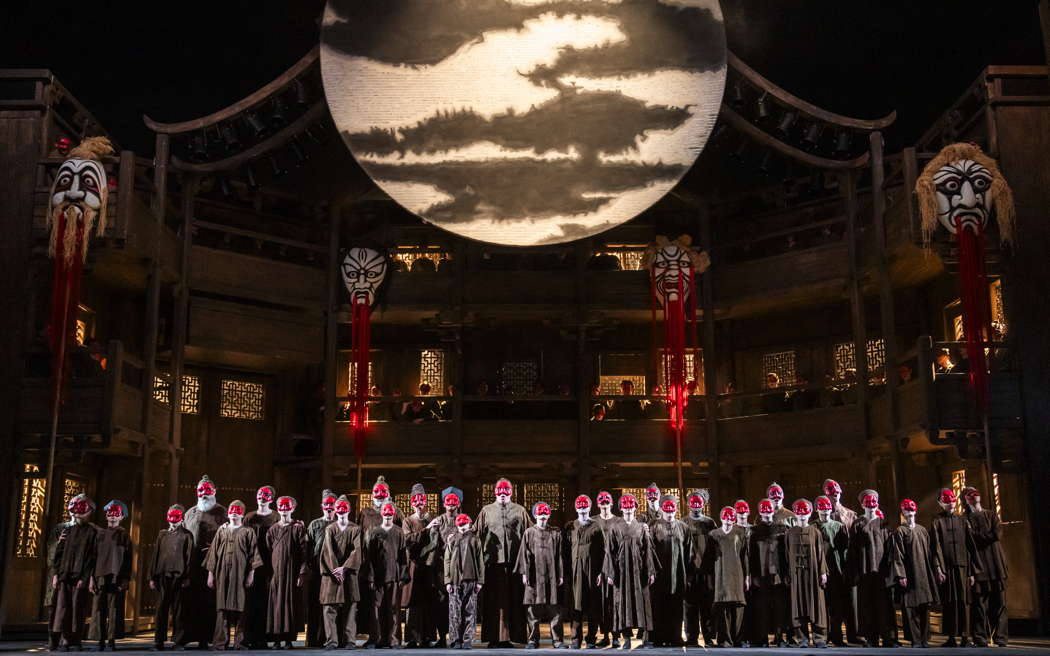
A scene from Andrei Şerban's production of Puccini's Turandot at Covent Garden. Photo © 2025 Tristram Kenton
Andrei Şerban's spectacular production remains a Covent Garden favourite: it draws upon Chinese and Italian theatrical tradition to evoke a richly imagined Peking, in a dazzling display of colour, drama, and dance.
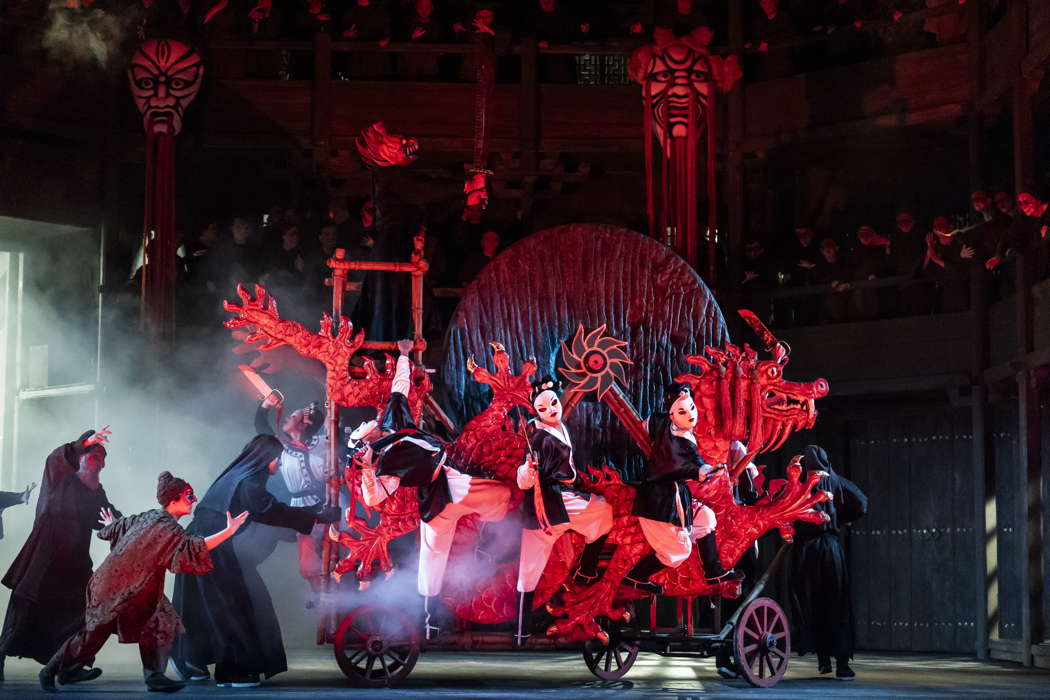
A scene from Puccini's Turandot at Covent Garden. Photo © 2025 Tristram Kenton
First staged at Covent Garden in 1984, the production grew out of the deep creative partnership between director Şerban and his designer, the late Sally Jacobs. Şerban's interpretation was rooted in the 1762 play by Italian playwright Carlo Gozzi, upon which Puccini based his opera. Gozzi recast the ancient tale - originally from Persia - as a fable set in an ancient, legendary China, replete with legend and deeply-held beliefs about ancestors. This revival is directed by Jack Furness who is joined by the original choreographer Kate Flatt: despite being forty years old, the production is as vivid and as incredible as if it had been created yesterday. I was amazed by the terrifying masks worn by the characters; the executioner's body painted green to match his monstrous mask as he wields a mighty scimitar.
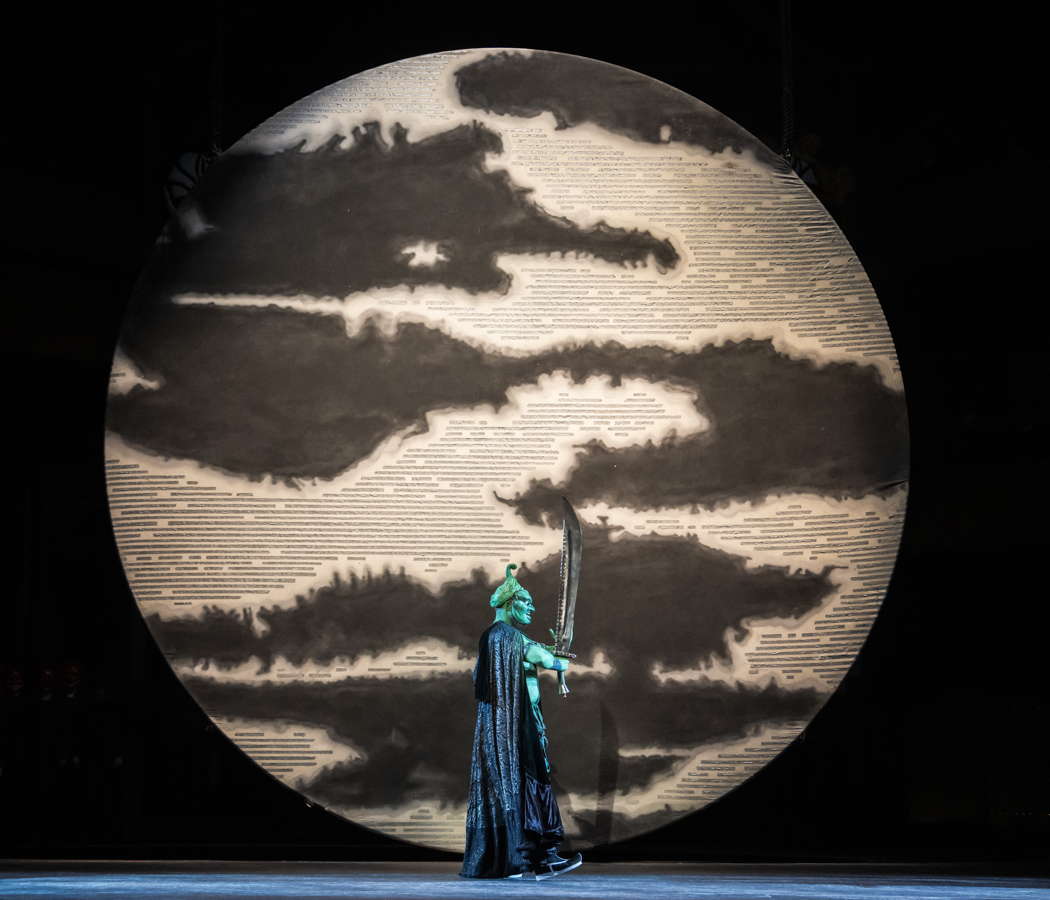
A scene from Turandot at Covent Garden. Photo © 2025 Tristram Kenton
The lighting and mise-en-scène are truly phenomenal: shards of light fall through the wooden shutters of the ancient Chinese palace: sometimes it is illuminated by moonlight; at others, light from lanterns as the guards pace the corridors.
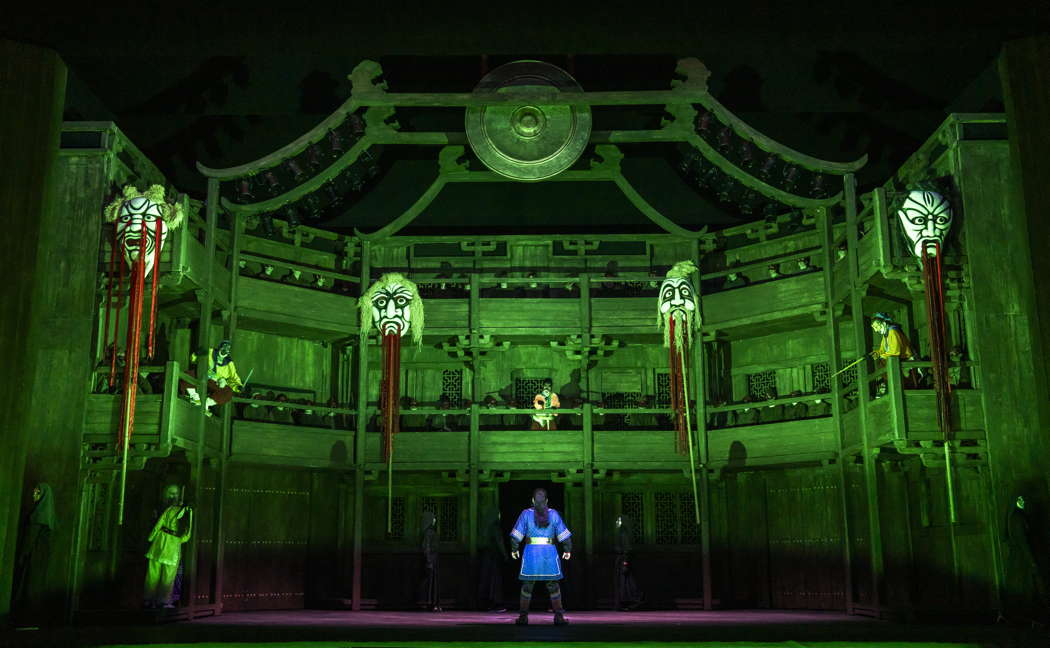
A scene from Turandot at Covent Garden. Photo © 2025 Tristram Kenton
Every detail is informed by the history of Chinese art, from the golden clouds that flank Turandot's ailing father, King of Heaven, to the dark inky clouds that grace the humungous moon and Turandot's red mantle.
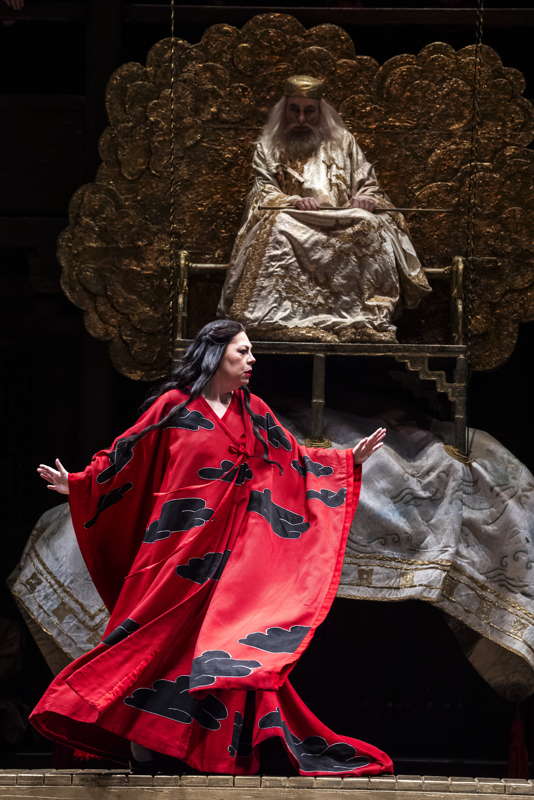
Sondra Radvanovsky as Princess Turandot
and Paul Hopwood as Emperor Altoum
in Turandot at Covent Garden.
Photo © 2025 Tristram Kenton
Acclaimed American-Canadian soprano Sondra Radvanovsky performs as the icy Princess Turandot in the first cast, with Polish-American soprano Ewa Płonka taking on the role from 12 April 2025 onwards. Radvanovsky was a triumph: carrying the role with aplomb, she masterfully evoked the transition from cruel princess to smitten lover as the narrative progressed.
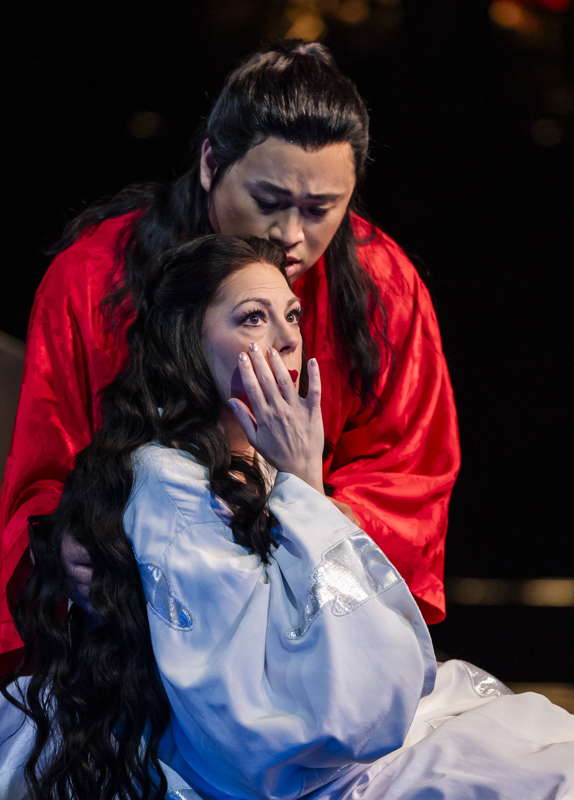
Sondra Radvanovsky as Turandot
and SeokJong Baek as Calaf
in Turandot at Covent Garden.
Photo © 2025 Tristram Kenton
SeokJong Baek and Gwyn Hughes Jones share the role of Calaf, and the role of Liù will be performed by Anna Princeva and Gemma Summerfield.
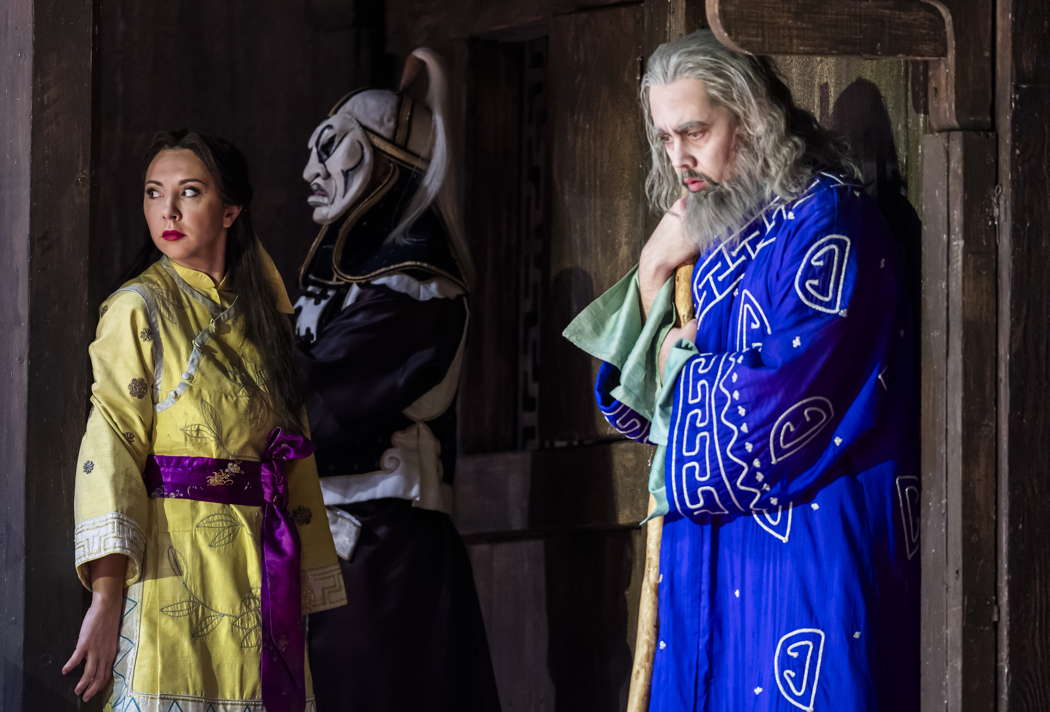
Anna Princeva as Liù and Adam Palka as Timur in Turandot at Covent Garden. Photo © 2025 Tristram Kenton
Rafael Payare returns to conduct the Orchestra of the Royal Opera House after his celebrated House debut in 2023, sharing the run with Francesco Ivan Ciampa. The orchestra was on very fine form, playing the glorious melodies with great sensitivity and ethereal beauty. Payare conducted with gusto, his arms, visible from the stalls, as energetic and lively as those of Bernstein.
My favourite line in Turandot, lyrically and musically, is when Liù sings to Calaf that her devotion to him as his servant derives from one particular moment in the palace, when he smiled at her. The opera's most famous aria is, of course, 'Nessun Dorma': Calaf sings in anticipation of triumph as all around the citizens of Peking stay awake all night in torment, trying to figure out the riddle he has set. Baek sang the aria with the light of victory in his eyes, enraptured by his having won and being in love with the princess. I was blown away.
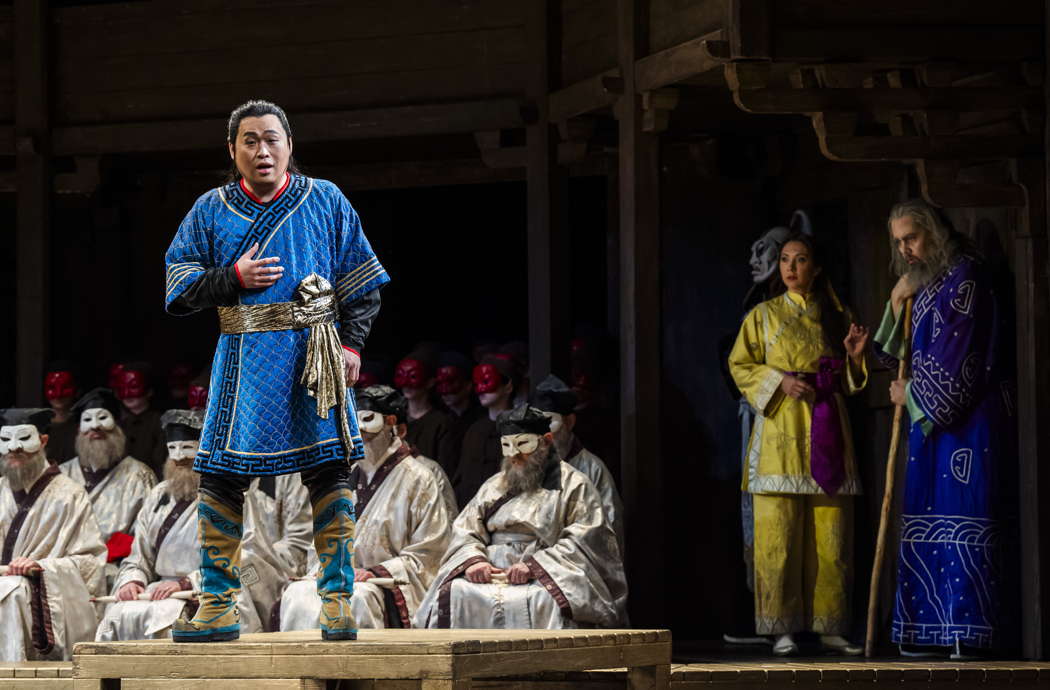
SeokJong Baek as Calaf (left), Anna Princeva as Liù and Adam Palka as Timur in Turandot at Covent Garden. Photo © 2025 Tristram Kenton
You would be wrong to think of the opera as being something of the nineteenth century: Puccini died before completing the work, with Franco Alfano finishing the work and giving it its premiere at La Scala two years later in 1926. It went on to become a worldwide success and part of the operatic repertoire.
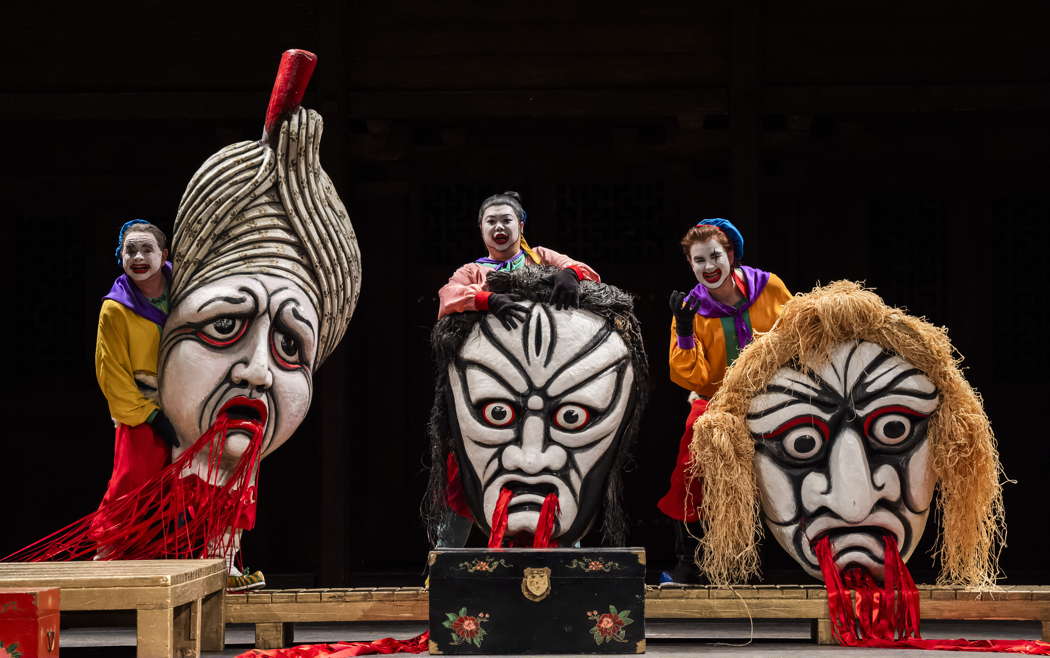
Aled Hall as Pang, Hansung Yoo as Ping and Michael Gibson as Pong in Turandot at Covent Garden. Photo © 2025 Tristram Kenton
With all my heart I give this recommendation strongly: even if you are not a seasoned opera fan, or even particularly keen on classical music: go and see Turandot at the Royal Opera House this season: book your ticket now. It is a tremendous flight of fancy; a true spectacle. Bravi tutti.
Copyright © 23 March 2025
Frances Forbes-Carbines,
London UK



